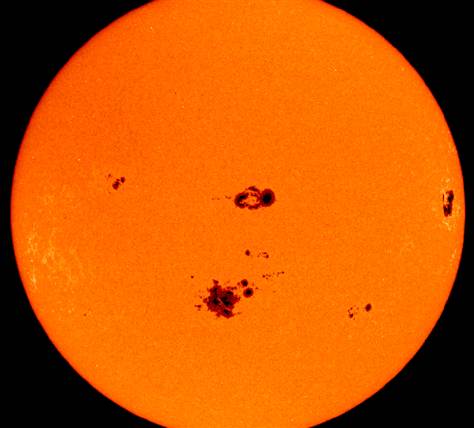What is the axial tilt of the Earth's axis
23.5 degrees
This scientist classified the galaxies by their shape. He also has a telescope named after him.
Who is Edwin Hubble
How many planets have 0 moons
2
The main two gases that the sun is composed of
What are hydrogen and helium?
How many planets are in the solar system
8
How many natural satelittes does the Earth have?
1
The moon
NASA Stands for:
_____ ______ and Space Administration
What is National Aeronautics and Space Administration
What kind of eclipse is this
What is a Lunar Eclipse
What are these dark areas called? 
What are sunspots
Name the Inner Planets
What are Mercury, Venus, Earth, & Mars
What is a solstice?
When the sun shines farthest north or south of the equator; first day of summer and first day of winter
This is a reusable space vehicle that takes off like a rocket and lands like an airplane
What is a Space Shuttle
How many days does it take for the Moon to revolve around the Earth
27.3 days
Surges of discharged energy that are produced along the sun's outer layer.
What are solar flares?
Most Asteroids orbit our sun, a star, in a region of space between the orbits of Mars and Jupiter known as the _______________
What causes day and night?
The Earth's rotation
What is an un-crewed vehicle that travels away from the earth.
What is a space probe
What phase(s) of the moon occur with Spring Tides
Full Moon and New Moon
What kind of celestial body is the Sun
A star
Name all the planets in the correct order
What are Mercury, Venus, Earth, Mars, Jupiter, Saturn, Uranus, and Neptune
My Very Excellent Mother Just Served Us Nachos
What are the three factors that make Earth habitable
What are liquid water, breathable atmosphere, and the amount of sunlight
Who stated this law?
Planets move faster when they are closer to the sun.
Kepler
When it comes to having influence over tides, why is the Moon's influence stronger than the Sun's
Its closeness to the earth results in about twice as much pull force.
Everything in our Solar System is held together by this.
What is the Sun's Gravitational Pull.
What is the difference between a meteor, a meteorite, and a meteoroid
A meteoroid is little chunks of rock and debris in space
A meteor, or shooting star, is when chunks of rock and debris fall through a planet’s atmosphere
A meteorite when hunks of rock and debris strike the surface of a body